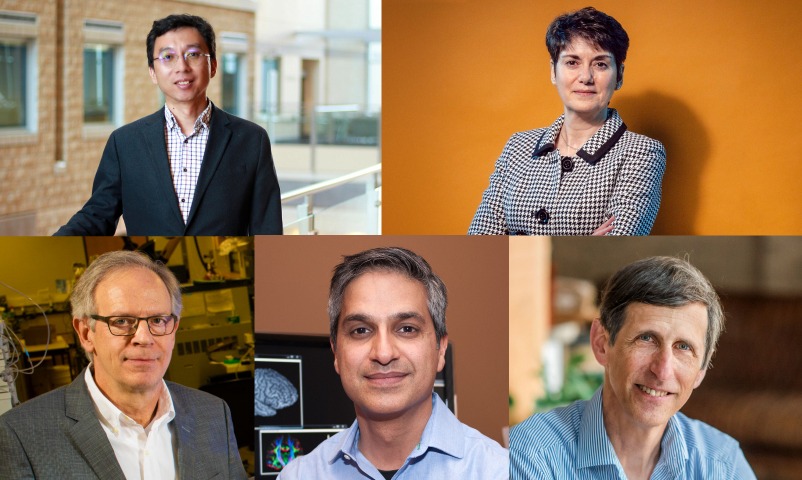U of A researchers leading in applying neuroinformatics to precision health research
Jon Pullin - 19 April 2022

From left, top row: Bo (Cloud) Cao, Vivian Mushahwar. Bottom row: Roger Dixon, Sanjay Kalra, Russ Greiner
Neuroinformatics is an exciting part of the future of care for patients with mental health and neurological disorders and researchers from the Neuroscience and Mental Health Institute (NMHI) at the University of Alberta are leading the way.
Neuroinformatics uses complex data analysis, artificial intelligence and computer modelling to help researchers learn about the brain and mental illness. Researchers study massive collections of data about the brain to uncover patterns and understand and potentially predict neurological and psychiatric disorders. Using these tools, scientists are coming closer to understanding how a range of factors play a role in mental illness.
Several NMHI members are using neuroinformatics in some fascinating research.
Bo (Cloud) Cao is developing AI-based tools to help doctors diagnose and treat psychiatric disorders more precisely. His team uses machine learning algorithms to learn about the patterns of multi-modal data (health records, brain scans and cognitive assessments) in patients with psychiatric disorders. Eventually, he hopes to achieve personalized medicine in mental health using these tools.
Vivian Mushahwar focuses on interventions for improving motor functions after neural injuries, including the restoration of standing and walking for a patient after a spinal cord injury. Mushawar's research involves placing hair-like electrical wires into the spinal cord which use electrical signals to trigger neural networks. Eventually, her lab hopes to use this technique to allow patients to walk again following a traumatic spinal cord injury. She is also developing other devices to prevent post-injury conditions such as spasticity, pressure ulcers and deep vein thrombosis.
Roger Dixon applies a suite of neuroinformatics technologies to the area of brain aging and Alzheimer’s disease, which accounts for over 60 per cent of dementia cases. Dixon and colleagues in the Canadian Consortium on Neurodegeneration in Aging (CCNA) use neuroinformatics technologies to help us understand the precursors to this disease. Specifically, he examines how and why some individuals advance through aging on pathways that lead toward Alzheimer’s disease, while others follow pathways that lead to sustained healthy brain aging. For example, with big and dynamic data sets (such as the CCNA), he applies machine learning computational techniques for identifying subtypes of aging individuals who are at elevated risk, distinguishing them from those who are at reduced risk for the disease. He then applies complementary machine learning techniques for discovering the key risk factor predictors for each subtype. These sensitive and powerful neuroinformatics approaches can lead to precision detection of high-risk individuals prior to diagnosis and to personalized intervention protocols for delaying or preventing further decline.
Sanjay Kalra is creating a platform that will help ALS researchers better understand the complex disease and find ways to personalize treatment for patients. ALS, often referred to as Lou Gehrig’s disease, is a neurological disorder that affects nerve cells and slowly severs the communication between the brain and the muscles of the body. One of the biggest challenges to treating the disease is that ALS varies from person to person. Kalra’s project seeks to tackle this challenge by gathering a complete biological picture of each ALS patient. Biological data gathered will give researchers added insight that can then guide their treatment of the disease, allowing them to offer patients more personalized options.
Russ Greiner is developing data-driven tools that assist healthcare practitioners with screening, diagnosing and treatment planning. For example, his team applies machine learning techniques to functional magnetic resonance images, electronic health records and speech data, to produce models that can be used to help diagnose schizophrenia, ADHD, PTSD or depression. These are all evidence-based, personalized precision health tools.
With this expertise and much more, the NMHI has launched a transdisciplinary, cross-cutting platform in neuroinformatics which will lead the way in producing new and important discoveries about neurological and mental health diseases and developing precise strategies for their prevention and treatment.